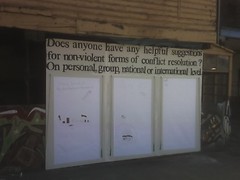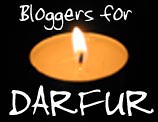I have only begun to recover from the initial shock of the fact that these bombings are going on in the last couple of days. The first day it started happening last week, I woke up at my usual time to get ready for work and turned on National Public Radio (NPR) which was playing BBC World News Radio reporting on the bombings. The first thought I had was "Heddy, wake up!" because surely, I thought it could only be a dream. Surely, all this political broo-ha-ha over the captured Israeli soldiers did not warrant killing of innocent lives. It was almost the same eery feeling I had when I was listening to NPR the morning that the September 11th attacks happened right here where I live. Being in NYC, obviously my life is not in danger or anything; nevertheless what's going on makes me incredibly sad and my heart goes out to all the Lebanese, especially those living in Beirut, and everyone in the MidEast that these bombings are going to cause further pain and heartache for... it just seems so senseless. Having worked on human rights violations and genocide issues for 5+ years, you think one would be able to adapt and get de-sensitized but I've never found that to be true in my case. I wonder sometimes whether that's a good or bad thing...
Although Amnesty (where I work) has put out statements and are conducting advocacy around this issue - I can't help but feel powerless to do anything to help, even being a part of an organization like Never Again. We've mostly been internally focused for awhile, or at least from where I sit. Marian and I have been talking about the need for us to internally equip ourselves to better respond to emergencies like Darfur and these bombings in Lebanon. Yes, we are doing a wonderful job given the time and resources we have, but it still doesn't let us off the hook in terms of responding to the needs of the world. How to accomplish all of this without letting the urgent and important tasks (like stopping violence in Darfur immediately) not crowd out the less urgent yet still important tasks (like post-conflict peacebuilding in Rwanda). More questions than answers these days, but at least beginning to search is part of the solution...
For the non-BBC, non-CNN version of things, read here: http://la.indymedia.org/news/2006/07/168619.php
Sorry if this post was not what folks were looking for... I just can't do the clinical, political, emotionally detached analysis right now with people dying and continuing to live under threat.
Saturday, July 22, 2006
Sunday, July 16, 2006
Peace Boards
Peace boards, based on Basia Forrest's Peace Posts that have been received enthusiastically by many members of Never Again, got to Stoke-on-Trent, UK, this weekend. The boards were accompanied by three soldiers sitting outwardly in the blazing sun.
They will stay for a few more weeks, giving us the opportunity to see how the people of Stoke respond to the chance to contribute their ideas to peacebuilding
Friday, July 14, 2006
Responsibility to Report
Never Again International in London invites you to join us in a conversation, 'Responsibility to Report'. Drawing on the lessons from Rwanda, 12 years ago this year, the debate will focus on current and future reporting of genocide and crimes against humanity. With a view to establishing a set of key recommendations to be put before media organisations, the debate will hear from those directly involved - from grass-roots reporters to editors setting news agendas.
In 2005, a change came that campaigners hoped would help prevent another Rwanda: the Responsibility to Protect. World leaders pledged that the international community, acting through the Security Council "was prepared to take collective action" in a timely and decisive manner" when states are "manifestly failing to protect their populations from genocide, war crimes, ethnic cleansing and crimes against humanity." (1)
Since then, governments and civil society have been furiously debating the meaning ot R2P and its implications.The words have been increasingly used in the press. However, there has so far been little debate on the significance of this change for journalists.
Because something has changed. Extreme violent conflict is no longer simply the businesses of other countries, Britain as a member of the Security Council could, potentially, now be held culpable if it was to repeat its response of 1994 which was to push for the withdrawal of peacekeepers in Rwanda.
So Britain has new responsibilities. But what responsibilities do journalists have? What makes a situation serious enough for a journalist to be able to state quite clearly that this is a situation in which the international community should be responding, not because that is the journalist's view but because our governments have promised to do so.
We will ask you to share your experiences and put forward ideas about our responsibilities as people involved in the media. We define the media in a very inclusive way and hope to hear about new developments that could help, rather than threaten, mainsteam journalists. We hope to build bridges and widen all of our perspecitves on the possibilities for news, on finding more voices and information our thinking on how situations that all of us agree are Very Bad can get attention. We will hear about has changed - or not changed - since she was reporting from Rwanda 12 years ago. We want to talk about the blocks that can mean genocide isn't news, but we also want to come out with positive ideas on how the media can fulfil its responsibility to hold power to account.
This conversation will be taking place in London in late July, bringing together youth, media experts, journalists, editors and grassroots voices. In the run-up to the event, we invite you to collaborate on this issue in our wiki project page.
In 2005, a change came that campaigners hoped would help prevent another Rwanda: the Responsibility to Protect. World leaders pledged that the international community, acting through the Security Council "was prepared to take collective action" in a timely and decisive manner" when states are "manifestly failing to protect their populations from genocide, war crimes, ethnic cleansing and crimes against humanity." (1)
Since then, governments and civil society have been furiously debating the meaning ot R2P and its implications.The words have been increasingly used in the press. However, there has so far been little debate on the significance of this change for journalists.
Because something has changed. Extreme violent conflict is no longer simply the businesses of other countries, Britain as a member of the Security Council could, potentially, now be held culpable if it was to repeat its response of 1994 which was to push for the withdrawal of peacekeepers in Rwanda.
So Britain has new responsibilities. But what responsibilities do journalists have? What makes a situation serious enough for a journalist to be able to state quite clearly that this is a situation in which the international community should be responding, not because that is the journalist's view but because our governments have promised to do so.
We will ask you to share your experiences and put forward ideas about our responsibilities as people involved in the media. We define the media in a very inclusive way and hope to hear about new developments that could help, rather than threaten, mainsteam journalists. We hope to build bridges and widen all of our perspecitves on the possibilities for news, on finding more voices and information our thinking on how situations that all of us agree are Very Bad can get attention. We will hear about has changed - or not changed - since she was reporting from Rwanda 12 years ago. We want to talk about the blocks that can mean genocide isn't news, but we also want to come out with positive ideas on how the media can fulfil its responsibility to hold power to account.
This conversation will be taking place in London in late July, bringing together youth, media experts, journalists, editors and grassroots voices. In the run-up to the event, we invite you to collaborate on this issue in our wiki project page.
Tuesday, July 11, 2006
Darfur and the ICC
NEW YORK: Yes, it gets tiring to see things getting worse but not better and it's easy to be a cynic. But a really good friend recently reminded me that we need to "be the change [we] wish to see in the world".
I sent the following letter to Condi Rice and my elected representatives in US Congress. You can do the same here: Take Action
July 11, 2006
Secretary of State Condoleezza Rice
U.S. Department of State
2201 C Street NW
Washington, DC 20520
Dear Condoleezza Rice,
I am profoundly concerned about the egregious crimes committed against the people of Darfur. I believe that the International Criminal Court (ICC) is an important instrument to protect human rights in Sudan, as well as deter future crimes in the region. I appreciate the U.S. administration's willingness to assist the ICC in carrying out its work in Darfur, and I urge even closer cooperation with the Court in the future. Please do everything in your power to keep pressure on the Government of Sudan to cooperate with the ICC investigation.
Thank you very much.
Sincerely,
Heddy N.
I sent the following letter to Condi Rice and my elected representatives in US Congress. You can do the same here: Take Action
July 11, 2006
Secretary of State Condoleezza Rice
U.S. Department of State
2201 C Street NW
Washington, DC 20520
Dear Condoleezza Rice,
I am profoundly concerned about the egregious crimes committed against the people of Darfur. I believe that the International Criminal Court (ICC) is an important instrument to protect human rights in Sudan, as well as deter future crimes in the region. I appreciate the U.S. administration's willingness to assist the ICC in carrying out its work in Darfur, and I urge even closer cooperation with the Court in the future. Please do everything in your power to keep pressure on the Government of Sudan to cooperate with the ICC investigation.
Thank you very much.
Sincerely,
Heddy N.
Subscribe to:
Comments (Atom)


